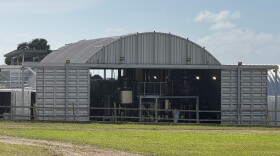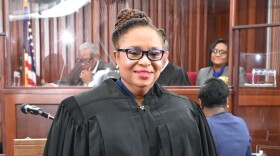ST. THOMAS – An eviction battle between a locally owned family business and the government of the Virgin Islands may have complicated a plan to develop an additional cruise ship berth and a tourist-oriented resort and commercial center in the Subbase area on St. Thomas.
Plans to transform Subbase have been discussed for decades, and in October draft legislation surfaced seeking to change the Submarine Base area from a “decaying industrial site and eyesore” to a modern cruise ship tourist attraction area.
“It’s a relationship between the Virgin Islands Port Authority, Royal Caribbean and CTI, which stands for Cruise Terminal International,” Carlton Dowe, VIPA executive director, told WTJX on Friday, adding that the parties were still in negotiations. “We have agreed to certain things in principle, but there is no final agreement.”
The draft legislation seeking to transfer land from GVI to VIPA for this development was placed on the legislative schedule for an October 29 session. But, as the date approached, it was removed from the agenda.
The reason appears to stem from an eviction case between the Department of Property and Procurement and one of its tenants, Island Laundries Ltd. However, WTJX was not able to confirm this with Senate President Milton Potter’s office.
The government filed an eviction action against Island Laundries in late August, the same month the Department of Licensing and Consumer Affairs revoked its business license after receiving a request from the Bureau of Internal Revenue citing nonpayment of taxes.
Leah Webster, president of Island Laundries, said the eviction notice came as a shock.
“We are still occupying the premises,” Webster said. “We are still actively in business. We’ve been in business since 1969 at that same location.”
Webster said Island Laundries ceased operations out of the derelict, light pink building located across from Crown Bay Marina around two years ago, since then operating at a limited capacity from a location she refused to disclose.
According to court documents, the last fully executed lease agreement between the parties expired in February 2014, rendering Island Laundries a month-to-month tenant.
Despite all of this, the government is still not in possession of Parcels Nos. 164 and 116 Submarine Base.
During a November 6 eviction hearing, William Harris, P&P’s property manager, testified that the parcels are necessary for the redevelopment project.
The eviction proceeding should have been simple. Instead, the lawsuit has unearthed a decades-long case study on favor-based politics in the territory, and how the government’s failure to adhere to its own policies sometimes plagues its ability to function efficiently.
The Case:
Evictions are intended to be simple, quick proceedings handled by the magistrate court. But since the government filed its initial complaint in August, more than 50 entries have appeared on the docket.
On November 6, Magistrate Judge Paula Norkaitis tabled an avalanche of motions, and told the parties that the focus of the hearing was whether Island Laundries has a credible legal position to challenge the eviction.
Island Laundries’ case hinges on the claim that it is not a tenant, but rather co-owner due to improvements the company says it made to the property in excess of $1 million dollars more than 30 years ago.
Island Laundries has leased property in the former naval station known as Subbase since before it was acquired by the government of the Virgin Islands, but it wasn’t until 1984 that the parties entered into an initial lease agreement.
The attorney for Island Laundries, Joseph Arellano, points to a clause in that 1984 lease that requires the government to repay Island Laundries for any unamortized costs of required improvements when the lease ends, at which point ownership of those improvements passes to the government.
Island Laundries argues that, under the 1987 amendment to the lease, the government required it to make certain improvements to the property, including building a 250,000-gallon cistern as well as retail and office space. To fund this, Island Laundries received a leasehold mortgage loan from Banco Popular for $800,000 in 1989, which is reflected in the second amendment to the lease. Months later, the company borrowed an additional $550,000.
Island Laundries claims all of the $1.35 million loan was put into these improvements, and therefore the title to the improvements rests with it until the government repays those costs.
In an interview with WTJX, Webster said these unamortized costs exceed $800,000.
The government, however, says any claims of co-ownership are illegitimate. It says the case is simple: the government owns the property, the lease has expired, and now it is moving to reclaim its property.
During the November 6 hearing, Assistant Attorney General Christopher Timmons questioned Lorna Webster, the matriarch of the Webster family, during cross-examination about her understanding of a leasehold mortgage.
Timmons argued that the lease itself was the security Island Laundries provided to Banco Popular in exchange for the loan, and therefore the leasehold interest expired alongside the lease at the end of the 30-year term in 2014.
Lorna Webster conceded that the lease had a 30-year term, and that it had been the security given for the loan, but she said the leasehold interest had no expiration date.

To Evict or Not to Evict:
Island Laundries does not dispute that the lease expired in 2014. Documents show the company began its formal appeals for a new lease in 2009. It knew the date was coming.
Island Laundries got its formal answer in April 2014 from then-Property and Procurement Commissioner Lynn Millin-Maduro, which spurred a contentious exchange of correspondence.
“Because the government has a master plan to make improvements in the Subbase area, we informed you that that department will not be processing a new lease agreement with you,” Millin-Maduro wrote in a letter to Island Laundries dated April 30, 2014, which recounted a meeting apparently held the day before. “Therefore, we informed you that your company must vacate and surrender the property.”
Oliver McCoy Webster, the then president of Island Laundries, responded two weeks later.
“This news meets with great disappointment as I have consistently over a 5 year period met with various deputy commissioners regarding this matter,” he wrote. “I have also spoken at length to assistant Commissioners Derek Gabriel and William Harris.”
McCoy Webster added that none of these conversations had indicated a lease renewal would be a problem.
Millin-Maduro responded.
“It is unfortunate that at the natural end of your lease agreement with the government that you fail to recall the history of your delinquency as a tenant,” she wrote, citing an unapproved mortgage, a history of delinquency on rent, and the failure to comply with a provision of the lease requiring Island Laundries to give the government a percentage of all monies acquired from subleasing.
But this attempt to have Island Laundries vacate the property went nowhere.
“We had an attorney at that time in 2014 when Property and Procurement tried to evict us from that space, and they were not successful,” Leah Webster said in an interview with WTJX.
At the end of 2014, just months before the de Jongh administration was succeeded by that of Kenneth Mapp, the P&P file goes quiet. At least until February 2017.
That’s when the file shows McCoy Webster and Vincent Richards, then P&P deputy commissioner, began corresponding about proposed terms for a new lease. At this point, Island Laundries was paying $943.70 per month in rent.
An appraisal report from April 2017, commissioned by P&P, estimated the rental value of the two buildings, almost 30,000 square feet combined, to be between $6 and $10 per square foot.
The next month, McCoy Webster proposed 50 cents per square foot. Richards responded rejecting the “ridiculously low” offer, but wrote that P&P “remains committed to negotiating a serious and mutually equitable lease agreement.”

The Hurricanes, The Roof, and a New Lease:
Despite McCoy Webster’s efforts, Island Laundries had still not secured a new lease with P&P when Hurricanes Irma and Maria destroyed a sizeable portion of the company’s roof in September 2017.
At the November 6 hearing, Leah Webster testified that her father began roof repairs about six months after the storms in an attempt to protect an expensive piece of company machinery.
Those repairs, however, were never completed. Leah Webster said she received a call from Richards instructing her father to stop the work. According to her testimony, Richards said he wanted to meet with her father, the contractor, and the architect but canceled the meeting 15 minutes before it was set to begin. She said Richards told them he would reschedule but never did.
A couple months later, in May of 2018, McCoy Webster died, and the business, as well as its quest for a new lease, passed to Leah Webster.
Leah Webster testified that, having seen the challenges her father faced dealing with P&P, she decided to meet directly with P&P Commissioner-nominee Anthony Thomas. Richards was also present. At the time of that meeting, she said, there was still no draft lease agreement. She recalled telling Thomas that she wanted to move forward with the lease or at least receive a decision on whether one would be granted.
Following that meeting, Leah Webster said she negotiated a new lease agreement directly with Richards through phone calls and emails.
This new 20-year lease was signed by Thomas in 2019. The lease had the option to renew for two additional 10-year periods, and it added two additional parcels of land. It also gave Island Laundries an extended construction phase of five years, during which time the company would pay $1,000 per month in rent. At the close of the construction phase, the rent would increase to $3,000 per month, a rate that Thomas wrote was acceptable “based on the amount of estimated improvements and long-term maintenance required.”
In his justification letter addressed to Governor Albert Bryan Jr., Thomas touted Island Laundries as an ideal tenant who would bring value to the Subbase area and outlined the government’s projected earnings courtesy of a monthly percentage to be paid to the government on all subleases.
“Where we left things after the Mapp administration was that we had successfully negotiated a lease, and that that lease would be signed by the governor,” said Leah Webster, whose sister Lisa Webster Potter served as Government House chief of Protocol under Mapp.
Bryan never signed the lease agreement, nor was it approved by the Legislature. But as of April of 2021, P&P was still emailing with Leah Webster as if the lease was moving forward.
And while Thomas claimed the government would enjoy subleasing revenues under this new agreement, Island Laundries has never paid subleasing fees despite an ironclad clause in the 1984 lease agreement, and in both amendments.
The “Nothing Burger”:
The failure to pay subleasing fees isn’t something Leah Webster is trying to hide. She said Island Laundries has never paid them.
“In our original lease there was not a subletting lease clause,” she told WTJX last month. “It’s always been a point of contention between if that was valid or not valid.”
Whether she was referring to a lease prior to 1984 is unclear. What is clear is that clause is indisputable.
Section 3.04 of the 1984 commercial lease agreement required Island Laundries to pay 15% of its gross income from subleasing to the government of the Virgin Islands. The section also restricted Island Laundries from subleasing any part of the property without written approval from P&P.
The lease was then amended twice, but neither of those amendments removed the sublease clause. In fact, the first amendment in 1987 increased the amount to 25% of gross income from subleasing.
Based on these percentages, the government should have been collecting a healthy sum in fees from a tenant with multiple subletters.
According to the file, Island Laundries sublet to at least four different tenants over some three decades. Two of them were government entities — the Law Enforcement Planning Commission (LEPC) and the now-defunct Narcotics Strike Force (NSF). The other two tenants never paid rent.
“One was Private Collections, which was a business that was owned by my mother, so she did not pay any rent,” Leah Webster said. “And then the other one is a calling station that was owned by my sister and her husband, and so they did not pay any rent either. So, there were no rental fees collected for that space. It was basically just a favor.”
McCoy Webster, Leah Webster’s father, was certainly aware of the sublease clause. So aware, in fact, that he repeatedly wrote to P&P to have the clause amended or removed. The department rejected each request, according to the file.
“Your request to amend section 3.04 of the ground lease regarding the 25% of all rents collected on your subleases to the government of the Virgin Islands is hereby rejected,” wrote Delma Hodge, then P&P commissioner, in a letter to McCoy Webster in 1991.
Hodge went on to write that the percentage clause was an integral part of all government commercial leasehold agreements. Despite these rejections to alter the clause, the government never collected the 25% owed to it.
This is outlined in a 1996 memorandum written by Dwayne Benjamin, P&P’s then director of Property. Addressed to Alvin Davis, P&P commissioner at the time, the memorandum details what Benjamin described as violations pertaining to all subleasing fees that should have been paid to the government.
“Mr. Webster has never paid any subleasing fees to the government as per Section 3.04 of the lease agreement,” Benjamin wrote.
According to this memorandum, LEPC and NSF began subleasing office space from Island Laundries in 1985 and 1989, respectively. Benjamin’s calculations tally the estimated subleasing fees owed for these two government tenants to be over $300,000 as of October 1996.
Benjamin also included calculations for Private Collections Inc., the boutique operated by McCoy Webster’s wife, Lorna Webster. According to his memorandum, Private Collections began occupying space in November 1988 but had no lease and paid no rent for the government-owned space, both violations of Island Laundries’ lease.
“Based on our review, Island Laundries, Ltd. is charging the government an average of $15.00 per square feet for office space. It is assumed that the government should collect subleasing fees at $15.00 per square feet for Private Collections Inc.,” Benjamin wrote.
Benjamin calculated that, from 1988 to 1996, the subleasing fees for Private Collections would have totaled $36,015.
Leah Webster said the government never collected those fees, and any discussion about it fizzled out.
“We haven’t heard anything at all from Property and Procurement or from anybody else, you know, about this supposed subletting fee since that time period,” she said. “It’s like a nothing burger.”
Meanwhile, Island Laundries continued renting space without paying subleasing fees for approximately 20 more years until the building was damaged during Hurricanes Irma and Maria in 2017.
Benjamin’s calculations didn’t stop at subleasing. He also found that Island Laundries’ rent should have been increased in both 1989 and 1994, but he said this was “to no avail.” And, as Island Laundries avoided any increase in its rent to the government, the company implemented rent increases for its government tenants, according to Benjamin’s memorandum, including an almost $15,000 increase in annual rent for NSF after their first year, “with no justification on file provided by Narcotics Strike Force nor Mr. Webster,” Benjamin wrote.
Benjamin concluded his memorandum by recommending that the government seek to collect the monies owed on all subleasing activities as well as readjust Island Laundries’ rent, which was $918 per month in 1996.
“If the following is not met, the government should initiate legal action for the recovery of all indebtedness and terminate this lease agreement,” Benjamin wrote.
The government did neither.
According to the file, after receiving Benjamin’s memorandum, Davis wrote to then-Governor Roy Schneider, informing him of the violation and urging him to assign an assistant attorney general to the department to litigate this issue, as well as “the many other varied lease violations” identified in an audit report.
The file contains no response from Schneider. But it does have a letter from Lawrence Sibilly, then deputy commissioner of P&P, to Benjamin explaining an apparent arrangement between the government and Island Laundries.
“It was understood by the parties that the lessor on his master lease would not have to pay percentage of gross income received from subleasing. We have attempted to renegotiate these leases so that the percentage in the master lease is amended,” Sibilly wrote to Benjamin in a letter dated October 29, 1997.
This understanding appears to stem from a meeting in 1992, between Sibilly, who was P&P’s acting commissioner at the time; Gaylord Sprauve, the drug policy advisor to Schneider; and McCoy Webster. Sibilly recounted this meeting in a letter to McCoy Webster, where he confirmed an amendment would be made to Island Laundries’ Business and Commercial Leasehold Agreement as long as Island Laundries agreed not to increase rental rates for LEPC and NSF. Sibilly added that this would require approval by the governor and the Legislature of the Virgin Islands.
Over the last two months, WTJX reviewed hundreds of documents dating back to 1983. Neither this discussed amendment, nor any gubernatorial or legislative approval, were found.
The issue of subleasing was not mentioned during the November 6 hearing, nor has the topic come up in documents filed by either the government or Island Laundries throughout this eviction proceeding.
WTJX reached out to P&P Commissioner Lisa Alejando for an interview, but the department declined the request citing the ongoing litigation.
Environmental Concerns:
Earlier this year, P&P attempted to gain access to the parcels leased by Island Laundries on two occasions to conduct an environmental assessment. Leah Webster denied them access both times.
“The dates requested are not good dates due to our ongoing maintenance,” Leah Webster wrote in an email to Harris, P&P's property manager, on May 30.
Research shows that in 2005, Island Laundries was cited by the Environmental Protection Agency (EPA) for violating federal rules governing the handling, storage, and disposal of hazardous waste following an inspection the agency conducted the year before.
“Leaks of these materials can cause respiratory problems for workers, contaminate ground water and seriously damage marine environments,” the EPA wrote in a statement about the violation.
The EPA said it was seeking a $280,008 penalty from Island Laundries. McCoy Webster met with the agency in New York City in October 2005, according to a statement from the EPA, where he contested the allegations and began settlement discussions.
In March 2007, the EPA announced the results of these settlement discussions. McCoy Webster would pay a $10,000 penalty. The agreement also required him to switch to less toxic solvents for dry cleaning and spend at least $20,000 to replace and upgrade equipment at the facility.
What’s Next:
A hearing is scheduled for Wednesday, where Norkaitis is expected to rule on the case — either evicting Island Laundries from this property, or transferring the case to the Civil Division.















